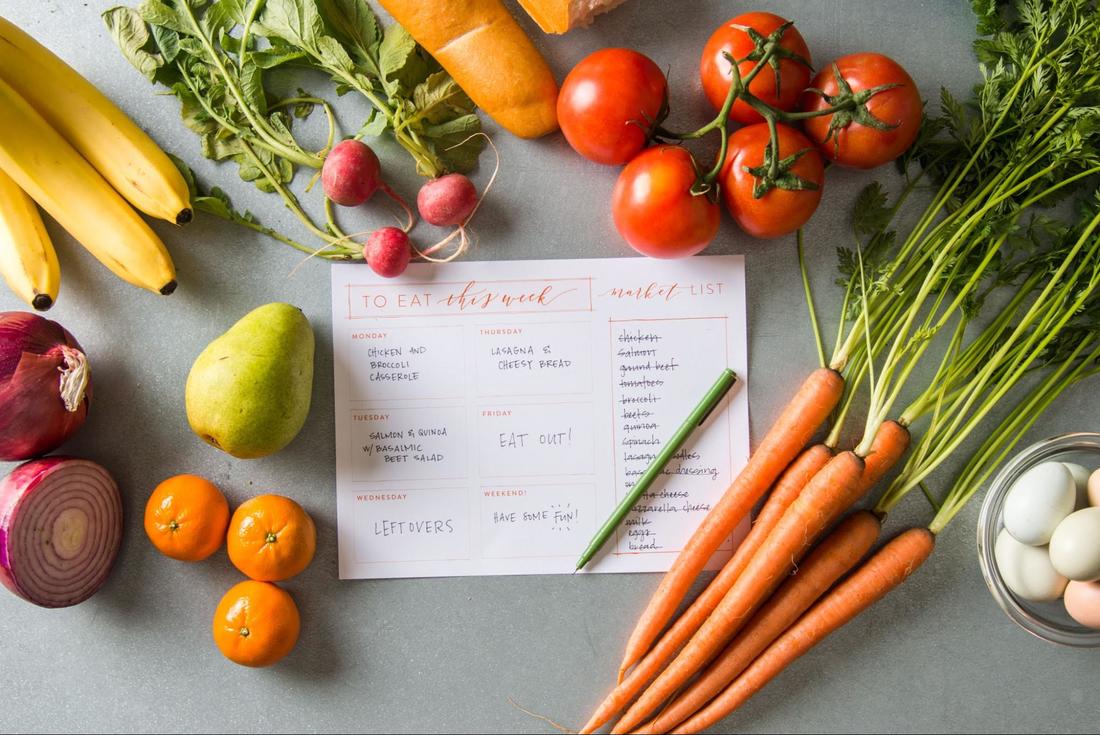|
It’s back-to-school season. That means back to routine and (hopefully) some sense of normalcy compared to summer. Regular schedules make it easier to predict mealtimes. However, school commitments can also lead to less free time. What does this mean in terms of healthy eating? Meal planning is key. Many of my clients get so overwhelmed by the idea meal planning they don’t know where to start. Following the steps outlined below will help provide you some guidance.
Step 1: Determine the number of meals you need to plan for Our routines may be predictable, or they may change week-to-week. Consider prep time, food budgets and eating environments when planning meals. For example, perhaps you want to have 3 dinners and 2 lunches planned for the upcoming week. Do your lunches need to be ‘grab-n-go’, or can you heat up food in a microwave? Do you have time to prepare dinners from scratch at home, or should one be a ‘set-and-forget’ meal done in the slow cooker. Write down the number of meals you need to prepare for the week and any necessary details (e.g. packed lunch, quick dinner). Step 2: Plan your menu Balanced meals should contain a variety of whole foods (i.e. food that doesn’t come out of a wrapper or package). Ideally, ½ the plate should be veggies and/or fruit, ¼ of the plate lean proteins and the last ¼ whole grains. Meal inspiration There are many places to find healthy meal ideas and recipes. Cookbooks and food magazines are great resources. But, most of my clients search the internet. I personally use Pinterest to find new recipe inspiration. Just be sure to read ingredients lists and find recipes that align with your nutritional goals. Also look at serving information if you are feeding a family or are planning for leftovers. Family favourites list I encourage my clients to create a list of at least 10 recipes that the whole family enjoys. These meals should also be easy and quick to make. Keep this list on the fridge when you run out of meal inspiration and ensure you are always stocked with the necessary ingredients. Some examples of quick last-minute meals include:
Overlap ingredients & plan for leftovers To save money, time and food waste, plan to make recipes that use similar ingredients. For example, if you want to make a recipe that calls for ½ a red onion, choose a second recipe that also incorporates red onion so that you use it up! The freezer is also a key tool when it comes to saving money and time. You can pretty much freeze anything so plan to cook once and eat twice by making extra recipe servings that you can freeze away for busy weeknight meals. Step 3: Make a grocery shopping list Shop your fridge and pantry first to make note of ingredients you have on hand. Then based on the recipes you’ve planned, create your shopping list. I’m a pen and paper type of person, but there are many apps to help with creating grocery lists (e.g. myShopi). The key is sticking to it! I also advise my clients to stock up on non-perishables as back-ups when they are on sale. Examples of non-perishable food items to keep on hand that make healthy additions to last-minute meals include:
Step 4: Schedule time to shop and prep If you are new to meal planning, set aside 3-4 hours each week to meal plan, write your grocery list, shop, and meal prep. Practice makes perfect. Over time you’ll become faster at every stage of the process. Healthy eating is hard work and meal planning takes effort. But, coming home to a delicious healthy meal, without the stress of figuring things out on the fly, is well worth the time and energy put into meal planning. Writer: Kerry Miller (Private Practice Registered Dietitian & Sport Nutritionist) Instagram: https://www.instagram.com/kerry.millerrd/
2 Comments
22/6/2020 02:27:00 am
I’m sure you will give the more overwhelming blogs like these blogs that I’ve enjoyed a lot. Thank you because you have been willing to share it in sequence with us. We will always be grateful for all you have done here because I know you are very worried about us. It was very healthy authored and easy to understand. Unlike added blogs I have read which not that are good. I also establish your posts very interesting. In information after reading, I had to go explain it to my friend and he enjoyed it as well!
Reply
11/5/2022 06:34:21 am
What an exquisite article! Your post is very helpful right now. Thank you for sharing this informative one.
Reply
Leave a Reply. |
Categories
All
Archives
November 2021
|
- Home/ News
- About
- Services/ Store
- Media
-
Learning Center
- ESN Athletic and Healthy Lifestyle Learning Center >
-
Professional Learning Center
>
-
The ESN Sports Nutrition Certificate
>
- ESN Learning Center - Sports Nutrition Certificate Level 1 >
- ESN Learning Center Sports Nutrition Certificate Level 2 >
-
ESN Learning Center - Sports Nutrition Certificate Level 3
>
- Module 1 - Periodization for the Athlete
- Module 2 - Nutrition Strategies to Optimize Recovery
- Module 3 - Sports Nutrition for Children and Young Athletes
- Module 4 - Sports Nutrition for the Aging Athlete
- Module 5 - Nutritional Strategies for Injury Prevention and Concussions
- Module 6 - Nutritional Strategies for the Travelling Athlete
- Module 7 - Tournament Nutrition Strategies
-
The ESN Sports Nutrition Certificate
>
- Contact
Proudly powered by Weebly


 RSS Feed
RSS Feed